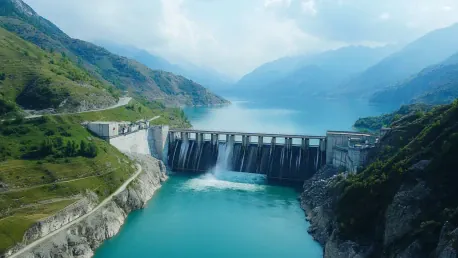Imagine a world where energy is both abundant and clean, where the natural power of water transforms our cities and communities into beacons of sustainability. This isn’t a far-fetched future; it’s happening now, driven by the immense potential of hydropower. As climate concerns escalate, hydropower’s role in reshaping our energy landscape has never been more significant.
Harnessing Nature’s Energy
There’s something almost magical about harnessing the sheer force of a rushing river to light up our homes. Hydropower, which produces electricity through the gravitational force of falling or flowing water, is one of the oldest and most reliable forms of renewable energy. But beyond its long history, its relevance today is more poignant than ever. As nations grapple with the urgency of reducing carbon emissions and transitioning away from fossil fuels, hydropower stands out as a formidable ally in this quest.
An engineer from a small hydroelectric plant in Oregon once noted, “The river’s flow sustains us, both literally and symbolically. Every kilowatt we generate here is a step toward a cleaner future.” Such anecdotes highlight the human element in the grand narrative of energy transformation.
Environmental and Economic Impacts
The transition to sustainable energy sources isn’t just an ecological necessity; it also brings with it economic benefits that are hard to ignore. Hydropower projects create jobs, boost local economies, and pave the way for future growth. When combined with other renewable sources like wind and solar, the impact becomes even more pronounced.
Consider the Three Gorges Dam in China, the world’s largest power station in terms of installed capacity. Not only does it produce a significant portion of the country’s electricity, but it also controls flooding and improves navigation along the Yangtze River. These multipurpose benefits exemplify the comprehensive impact hydropower can have on a region’s development.
Challenges and Innovations
While the potential of hydropower is vast, it’s not without challenges. Environmental concerns, such as the impact on aquatic ecosystems and water quality, can pose significant hurdles. However, innovations in technology and management practices are continually evolving to mitigate these issues.
For instance, the advent of small-scale and run-of-river hydropower systems offers promising solutions. These installations, which divert only a portion of the river’s flow, minimize ecological disruptions while providing reliable energy. Advances like these illustrate how hydropower can adapt and flourish in harmony with its surroundings.
A Global Commitment
Across the globe, countries are recognizing the strategic importance of hydropower in their energy portfolios. In countries like Norway, nearly all electricity comes from hydropower. The United States and Canada have also made significant strides, integrating hydropower into their renewable energy strategies.
The International Energy Agency (IEA) forecasts significant growth in hydropower capacity over the next several years, driven by both emerging and developed markets. This global momentum underscores the collective understanding that a sustainable energy future hinges on diverse, renewable sources working in concert.
Charting the Path Forward
As we look ahead, it’s clear that hydropower will continue to play a pivotal role in our journey toward sustainability. New technologies, policy frameworks, and public awareness will shape how effectively we can harness this resource.
Investing in research and development, fostering international cooperation, and prioritizing ecological considerations will be critical. Governments, businesses, and citizens alike must embrace the responsibility and opportunity to create a sustainable energy landscape.
In light of the challenges we face, the path forward involves actionable steps to promote hydropower as a critical component of a comprehensive renewable energy strategy. By building on collective efforts and incorporating forward-thinking innovations, we can ensure that future generations enjoy the benefits of a cleaner, more resilient world.
With the power to transform not just our energy systems but our society as a whole, hydropower’s journey toward a sustainable future is one we all have a stake in. Now is the time to harness its full potential.









